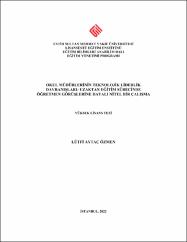Okul Müdürlerinin Teknolojik Liderlik Davranışları:Uzaktan Eğitim Sürecinde Öğretmen Görüşlerine Dayalı Nitel Bir Çalışma
Künye
ÖZMEN, Lütfiye AYTAÇ, Okul Müdürlerinin Teknolojik Liderlik Davranışları:Uzaktan Eğitim Sürecinde Öğretmen Görüşlerine Dayalı Nitel Bir Çalışma, Fatih Sultan Mehmet Vakıf Üniversitesi Lisansüstü Eğitim Enstitüsü Eğitim Bilimleri Anabilim Dalı Eğitim Yönetimi Programı, Yayımlanmamış Yüksek Lisans Tezi, İstanbul 2022.Özet
Araştırmanın problem cümlesi “eğitim sürecinde okul müdürlerinin
teknolojik liderlik yeterlilikleri ve süreçte karşılaşılan sorunların çözümlenmesinde
teknolojik liderlik yeterliliklerine ilişkin öğretmenlerin algıları nasıldır?” şeklinde
belirlenmiştir. Bu araştırmada, uzaktan eğitime uyum ve sorunların çözümü
sürecinde okul müdürlerinin teknolojik liderlik yeterliliklerini ilişkin öğretmen
görüşlerini analiz etmek amaçlanmıştır. Nitel araştırma yaklaşımlarından
fenomenoloji (olgu bilim) desenine uygun olarak tasarlanmıştır. Bu araştırma 2020-
2021 Eğitim-Öğretim Yılında İstanbul İli Sultangazi ve Üsküdar İlçelerinde devlete
ait ortaokullarda görev yapan 20 öğretmen ile yürütülmüştür. Çalışma grubunun
seçiminde amaçlı örnekleme yöntemlerinden aykırı durum örnekleme yöntemi tercih
edilmiştir. Araştırmada veriler yarı yapılandırılmış görüşme formu kullanılarak
toplanmıştır. Araştırmada yarı yapılandırılmış görüşme formu ile elde edilen veriler
içerik analizi yapılarak değerlendirilmiştir. Araştırma bulgularına göre verileri analiz
edildiğinde toplamda 14 kategori oluşturulmuştur, bu kategorilerden 5 farklı tema
ortaya çıkarılmıştır. Bu araştırmadan ortaya çıkan temalar; “liderliğe dair algılar,
etkili ve yetkin liderler, teknolojik liderlik rolleri, liderlik yeterliliğini etkileyen
değişkenler, problem çözmedeki yetkinlik” olarak belirlenmiştir. Araştırma sonucuna
göre, katılan öğretmenlerin 9’u maddi imkân sorunları, altyapı ve teknik sorunları
çözmede; 11’i de uygulamalar sırasında karşılaşılan sorunları çözmede, siber
güvenlik sorunlarını çözmede ve doğru teknoloji kullanımına yönlendirmede okul
müdürlerinin teknolojik liderlik yeterliliklerinin ön plana çıktığına ilişkin görüş
belirttikleri görülmüştür. Araştırmaya katılan öğretmenlerin çoğunluğu uzaktan
eğitim uygulamalarını yürütürlerken karşılaştıkları sorunları çözmede, uygulamalar
sırasında siber güvenliğe dair sorunların çözümüne rehber olmada okul müdürlerinin
teknolojik liderlik yeterliliklerini etkin bir şekilde kullanmaya çalıştıklarını
belirttikleri sonucuna ulaşılmıştır. Araştırma sonuçlarından hareketle okul
müdürlerine teknolojik liderlik becerilerini geliştirecek eğitimler verilmesi, okul
müdürlerinin çalışanlarını teknoloji kullanımına teşvik etmeleri ve okul müdürlerinin
teknolojik gelişmelere karşı değişim öncülüğü etmeleri konularında öneriler
geliştirilmiştir. The problem statement of the research was determined as “what are the
teachers’ perceptions of technological leadership competencies of school principals
in the education process and technological leadership competencies in solving the
problems which are encountered in the process?” In this research, it was aimed to
analyze the teacher’s views on technological leadership competencies of school
principals in the process of adaptation to distance education anol solving problems. It
was designed in accordance with the phenomenology pattern which is one of the
qualitative research approaches. This research was conducted with 20 teachers
working in state secondary schools in Sultangazi and Uskudar districts in İstanbul
province in the 2020-2021 academic year. In the selection of the study group, outlier
sampling method, which is one of the purposive sampling methods, was preferred.
The data were collected using a semi-structured interview form in the research. In the
research, the data obtained with the semi-structured interview form were evaluated
by content analysis. In tatol, 14 categories were created,5 different themes were
revealed from these categories when the data were analyzed according to research
findings. The themes which emerged from this research were determined as
“perceptions of leadership, effective and competent leaders, technological leadership
roles, variables affecting leadership competence and competence in problem
solving.” According to results of the research, It was seen that 9 of the participating
teachers stated that technological leadership competencies of the school principals
come to fore in solving financial problems, infrastructure and technical issues; 11 of
them expressed the opinion that the technological leadership competencies of the
school principals come to fore in solving problems encountered during the
implementations, in solving the cyber security problems and in directing the correct
technology use. It was concluded that the majority of the teachers participating in the
research stated that the school principals tried to use the technological leadership
competencies effectively in solving the problems they encountered while conducting
distance education applications and in guiding the solution of the problems related to
cyber security during the applications. Based on the results of the research,
suggestions were developed in maters providing trainings to school principals to
improve their technological leadership skills, encouraging their employees to use technology and leading the change against technological developments by school
principals.



















